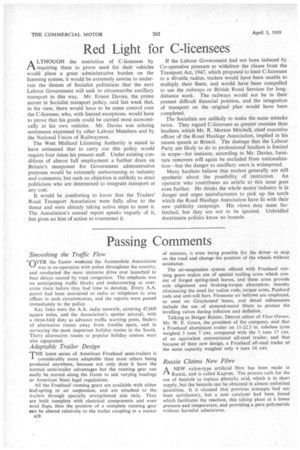Red Light for C-licensees
Page 36

If you've noticed an error in this article please click here to report it so we can fix it.
A LTHOUGH the restriction of C-licensees by requiring them to prove need for their vehicles would place a great administrative burden on the licensing system, it would be extremely unwise to underrate the threats of Socialist politicians that the next Labour Government will seek to circumscribe ancillary transport in this way. Mr. Ernest Davies, the prime mover in Socialist transport policy, said last week that, in his view, there would have to be some control over the C-licensee, who, with limited exceptions, would have to prove that his goods could be carried most economically in his own vehicles. Mr. Davies was echoing sentiments expressed by other Labour Members and by the National Union of Railwaymen.
The West Midland Licensing Authority is stated to have estimated that to carry out this policy would require four times his present staff. Under existing conditions of almost full employment a further drain on Britain's manpower for Government administrative purposes would be extremely embarrassing to industry and commerce, but such an objection is unlikely to deter politicians who are determined to integrate transport at any cost.
It would be comforting to know that the Traders' Road Transport Association were fully alive to the threat and were already taking active steps to meet it. The Association's annual report speaks vaguely of it, but gives no hint of action to counteract it. If the Labour Government had not been induced by Co-operative pressure to withdraw the clause from the Transport Act, 1947, which proposed to limit C-licensees to a 40-mile radius, traders would have been unable to multiply their fleets, and would have been compelled to use the railways or British Road Services for longdistance work. The railways would not be in their present difficult financial position, and the integration of transport on the original plan would have been completed.
The Socialists are unlikely to make the same mistake twice. They regard C-licensees as greater enemies than hauliers, which Mr. R. Morton Mitchell, chief executive officer of the Road Haulage Association, implied in his recent speech at Bristol. The damage that the Labour Party are likely to do to professional hauliers is limited in scope—for instance, according to Mr. Davies, furniture removers will again be excluded from nationalization—but the danger to ancillary users is widespread.
Many hauliers believe that traders generally are still apathetic about the possibility of restriction. An operator who contributes an article to this issue goes even further. He thinks the whole motor industry is in danger and urges manufacturers to pick up the torch which the Road Haulage Association have lit with their new publicity campaign. His views may seem farfetched, but they are not to be ignored. Unbridled doctrinaire politics know no bounds.
































































































































